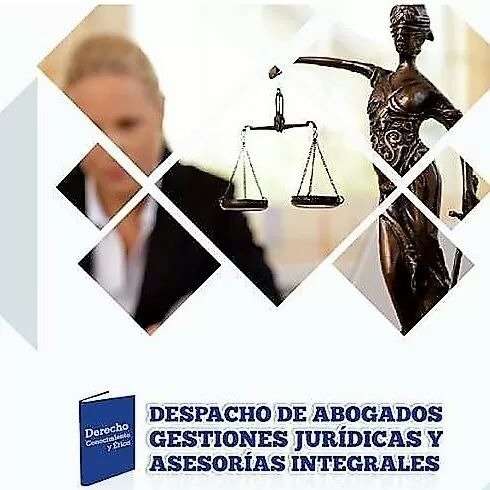Best Bankruptcy Lawyers in Valledupar
Share your needs with us, get contacted by law firms.
Free. Takes 2 min.
List of the best lawyers in Valledupar, Colombia
About Bankruptcy Law in Valledupar, Colombia
Bankruptcy law in Valledupar, Colombia, is designed to provide individuals and businesses facing insurmountable debt with an opportunity for rehabilitation and a fresh start. The process involves liquidating assets or restructuring debts to satisfy creditors in a fair and organized manner. Colombian bankruptcy law is governed by the Insolvency Law (Ley de Insolvencia) and monitored by judicial authorities to ensure equitable resolutions.
Why You May Need a Lawyer
Filing for bankruptcy can be a complex process, and seeking the advice of a qualified lawyer can be crucial in navigating this legal procedure. Situations where you may need a lawyer include: - An inability to meet debt obligations consistently. - Threats of legal action or asset seizure by creditors. - Need to understand the implications of filing for bankruptcy and the potential protection from collectors. - Guidance in court proceedings and understanding legal paperwork. - Negotiating with creditors for manageable repayment terms.
Local Laws Overview
In Valledupar, the bankruptcy process is heavily influenced by Colombia’s national Insolvency Law, which lays out two primary frameworks: liquidation and reorganization. The reorganization process allows debtors to propose a plan to pay off debts in a managed way, often preserving some of their operations. Liquidation involves the selling off of a debtor's assets to satisfy outstanding obligations. Additionally, special provisions exist for micro and small enterprises to encourage their financial recovery.
Frequently Asked Questions
What qualifies me for bankruptcy in Valledupar?
You may qualify for bankruptcy if you are unable to fulfill your financial obligations and have outstanding debts that surpass your assets.
Is bankruptcy in Valledupar applicable to both individuals and businesses?
Yes, the bankruptcy laws apply to individuals as well as to businesses in Valledupar, allowing both to seek relief from creditors.
What are the consequences of declaring bankruptcy?
Consequences can include a mark on your credit score, potential loss of assets, and a legal obligation to follow the repayment plan or court’s decision. However, it also provides relief from collection actions and potential debt forgiveness.
How long does the bankruptcy process take in Valledupar?
The duration can vary depending on the complexity of the case, ranging from several months to a few years.
Can I retain my assets after filing for bankruptcy?
Retaining assets depends on the type of bankruptcy and the assets involved. In some cases, essential assets may be protected, but others might be liquidated.
What is the role of a conciliator in the bankruptcy process?
A conciliator acts as an intermediary between the debtor and creditors to facilitate negotiations and reach a feasible repayment agreement.
How often can you file for bankruptcy?
Colombian law typically requires a significant period between filings; specifics can vary, and legal guidance on your particular circumstances is recommended.
What happens to secured debts during bankruptcy?
Secured debts are typically given priority, meaning that secured creditors will often reclaim collateral or be given preference in repayment plans.
Does Valledupar have specific courts for bankruptcy cases?
Bankruptcy cases are generally handled by civil circuit courts in accordance with national laws. These courts have the jurisdiction to oversee proceedings and hearings.
Are there alternatives to bankruptcy in Valledupar?
Yes, alternatives include debt restructuring, refinancing, and negotiation directly with creditors for reduced or modified payment plans.
Additional Resources
Those seeking further assistance can turn to local chambers of commerce for resources catered to businesses, or the municipal government’s legal aid services. Colombia’s Superintendence of Companies (Superintendencia de Sociedades) is the regulatory body overseeing insolvency cases, and their resources could provide further insight and assistance.
Next Steps
If you believe bankruptcy might be a solution to your financial situation, it is advisable to consult with a certified bankruptcy attorney in Valledupar. They can provide detailed advice tailored to your circumstances. Prepare all necessary financial documentation, including a list of debts, assets, and incomes, to offer your lawyer a clear view of your financial situation. Consider contacting the local bar association for referrals to qualified attorneys specializing in bankruptcy law.
Lawzana helps you find the best lawyers and law firms in Valledupar through a curated and pre-screened list of qualified legal professionals. Our platform offers rankings and detailed profiles of attorneys and law firms, allowing you to compare based on practice areas, including Bankruptcy, experience, and client feedback.
Each profile includes a description of the firm's areas of practice, client reviews, team members and partners, year of establishment, spoken languages, office locations, contact information, social media presence, and any published articles or resources. Most firms on our platform speak English and are experienced in both local and international legal matters.
Get a quote from top-rated law firms in Valledupar, Colombia — quickly, securely, and without unnecessary hassle.
Disclaimer:
The information provided on this page is for general informational purposes only and does not constitute legal advice. While we strive to ensure the accuracy and relevance of the content, legal information may change over time, and interpretations of the law can vary. You should always consult with a qualified legal professional for advice specific to your situation.
We disclaim all liability for actions taken or not taken based on the content of this page. If you believe any information is incorrect or outdated, please contact us, and we will review and update it where appropriate.








